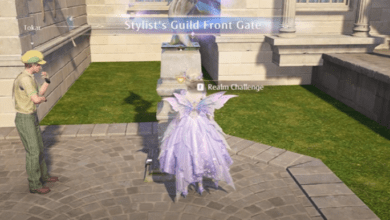The Afterlife of Elves in The Lord of the Rings: What Happens When They Die?
The world of The Lord of the Rings is rich with lore, including the unique fate of its immortal Elves. Although Elves are known for their immortality, they are not invincible. Battles and conflicts throughout Middle-earth, especially during the Second and Third Ages, have claimed the lives of many Elves. So, what happens when they die? The answer is deeply connected to the mythological and spiritual structure of Tolkien’s world, making the concept of death for Elves quite different from that of mortal beings.

Immortality in Middle-earth: What Does It Mean for Elves?
Before diving into the specifics of Elf afterlife, it’s essential to understand the nature of Elven immortality. In Tolkien’s universe, the term “immortal” refers not to invincibility but to the longevity of their spirits. Unlike Men, Hobbits, and Dwarves, who are bound to eventually die from old age, Elves possess eternal souls. While their bodies can be killed in battle, sickness, or through other physical means, their spirits continue to exist. Essentially, Elves cannot die of natural causes but can be slain.
So, what happens to their souls when their bodies perish? This is where the intricate mythology of The Lord of the Rings comes into play.
The Halls of Mandos: An Elvish Limbo
When an Elf dies, their soul does not vanish but is taken to the Halls of Mandos in the distant land of Valinor, also known as the Undying Lands. These Halls, overseen by the Vala Mandos, act as a sort of spiritual resting place or purgatory for the dead. Elves who enter these halls are given time to reflect, heal, and come to terms with their death. In this limbo-like state, their spirits can remain for a variable period sometimes for years, sometimes for centuries.

The stay in the Halls of Mandos can serve multiple purposes. For some Elves, it allows them to recover from the trauma of their death or the events of their lives. Others, especially those who may have committed wrongdoings, could be imprisoned in the halls as a form of penance. However, most Elves who enter these halls will eventually be given the choice to reincarnate.
Reincarnation of Elves: A Second Chance at Life
One of the most fascinating aspects of Elven death in The Lord of the Rings is the potential for reincarnation. Unlike mortals whose souls pass on to an unknown afterlife after a brief stay in the Halls of Mandos, Elves have the opportunity to return to the world of the living. This reincarnation typically occurs in Valinor, where their souls are placed into new bodies, allowing them to continue their existence among their kin.

However, reincarnation for Elves comes with limitations. While they may live on in Valinor, many of these reincarnated Elves are not permitted to return to Middle-earth. For example, Glorfindel, one of the most famous Elves in Tolkien’s lore, is one of the rare exceptions to this rule. After his death during the First Age, Glorfindel was reincarnated and later allowed to return to Middle-earth to aid in the war against Sauron. Yet, such instances are exceedingly rare, and most reincarnated Elves remain in the Undying Lands, separated from the world of Middle-earth.
Why Is the Death of Elves Tragic?
If Elves can be reincarnated and their spirits live on, why is their death still considered tragic? The answer lies in the emotional and geographical separation that death creates. When Elves die, they leave Middle-earth and enter the Undying Lands, which many will never return from. This means their loved ones who remain in Middle-earth must live with the loss of their presence, knowing that they will not be reunited unless they, too, pass into Valinor.
Furthermore, the physical pain of death and the emotional toll it takes are still very real for Elves. While their immortality allows them to avoid natural death, the anguish of losing their physical form in battle or other violent means is a significant aspect of their experience.
Elf Reincarnation vs. Human Afterlife: A Stark Contrast
The afterlife of Elves in Tolkien’s world is vastly different from that of mortal beings. Humans, Hobbits, and Dwarves, while mortal, follow a separate path after death. Like Elves, their souls are also brought to the Halls of Mandos. However, after a short stay, mortal souls are sent to an unknown realm where they remain with Eru Ilúvatar, the god-like figure of The Lord of the Rings mythology.
While the Elves’ immortality binds their souls to Arda (the Earth), mortal beings are freed from the world upon their death. This distinction creates a significant divide between the two races. Humans, in many ways, are seen as having a greater freedom in death, as their souls are not tied to the world of Arda for eternity. Elves, on the other hand, are bound to the fate of the world, unable to escape it until the world itself comes to an end.
Mandos’ Role in Elven Fate: Judgment and Rebirth
Mandos, as the Vala responsible for the afterlife, plays a crucial role in determining the fate of Elven souls. His judgment is often decisive in whether an Elf will be reincarnated or remain in the Halls of Mandos indefinitely. This decision can be influenced by the Elf’s actions during their life. Those who have led virtuous lives are more likely to be reincarnated and allowed to live peacefully in Valinor. On the other hand, Elves who have committed evil deeds, such as those involved in the Kinslaying, may be denied reincarnation altogether or kept in the halls as a form of spiritual punishment.
This brings an added layer of complexity to Elven immortality. While their souls live on indefinitely, the afterlife is not without its trials. The decisions made in life can affect their fate in death, making their time in Middle earth all the more meaningful.
Elven Heroes and the Afterlife: Glorfindel and Beyond
The character of Glorfindel provides a fascinating example of Elven reincarnation. After his death in battle during the First Age, Glorfindel’s spirit was brought to the Halls of Mandos. After a period of reflection and healing, he was reincarnated and later allowed to return to Middle-earth. His story is exceptional because he is one of the few Elves to be granted this opportunity. His return signifies the importance of his role in the fight against Sauron and highlights the rare nature of such reincarnations.
Other Elven heroes, such as Finrod Felagund and Thingol, were not so fortunate. Despite their noble deeds, they were not reincarnated into Middle-earth but remained in Valinor. This selective reincarnation adds a layer of mystique to the Elven afterlife, suggesting that not all souls are meant to return, even if they have led heroic lives.
The Eternal Fate of Elves in Middle-earth
In conclusion, the death of an Elf in The Lord of the Rings is far from the end. Their immortal souls live on in the Halls of Mandos, where they may be judged, healed, or reincarnated. This complex system of afterlife and reincarnation adds depth to Tolkien’s world, making the fate of Elves a poignant part of the story. Although death separates them from their loved ones and Middle-earth, their spirits remain bound to the world until its end. Their immortal nature, while a gift, comes with its own set of challenges, making their fate both tragic and deeply mystical.





